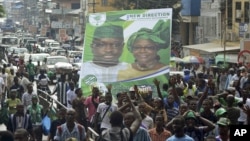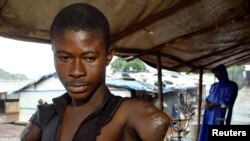FREETOWN —
People in Sierra Leone will head to the polls to vote for a president and parliament in less than three weeks. Ten political parties are registered, and one of them is led by a former member of a rebel group that fought in the country's civil war.
Revolutionary United Front
Eldred Collins is a former spokesperson for the Revolutionary United Front, a rebel group that fought the Sierra Leone government in a decade-long civil war in the 1990s. The group was notorious for amputations, rapes, and murders.
In 2009, RUF leaders were found guilty and imprisoned for crimes against humanity and war crimes.
It has been 10 years since the war ended and Collins says his group, now called the Revolutionary United Front Party, is ready to win this year's election.
This is the third Sierra Leone election since the war and the second time the Revolutionary United Front Party has a member running for president. Collins says the first was Paolo Bangura in 2002.
Collins says despite the past he can bring a positive change to Sierra Leone.
"What responsible government has thought about the age, thought about education system? Look at youth all around, dancing around with no job, no education," he said. "A country with such a high illiteracy rate is hard to develop, we have to develop the people if we can develop the country."
Collins adds he is fully aware of the Revolutionary United Front's negative reputation. But he says it is time people looked beyond that.
"The truth has not come out, when truth come you will know most things they have said about RUF is wrong, so we are going around, sensitizing people and educating people," he said.
The Revolutionary United Front Party was created under the 1999 Lome peace accord. The agreement between then-president Ahmad Tejan Kabbah and RUF leader Foday Sankoh said the rebels would disarm if given political opportunities.
Former child-soldiers
Some people, such as former child-soldier Kabba Williams, say the party should be given a fair shot in the upcoming election. He was captured and forced to fight with the RUF at the age of six, but says it is time to forgive and forget.
"I believe that if we want to consolidate to preserve the peace, which we have struggled for, we need to encourage and involve each and everyone," he said.
Williams said this could be an example for other African countries.
"It will also send signal to other war-torn countries, like LRA [Lord's Resistance Army] leader Joseph Kony and others, that being in the bush is not the solution, it is high time for them to come to town and create their own party," he said.
Painful memories
Others have a different point of view.
"Myself, I lost my father and my mother during the war, I do not even want to hear a name like RUF, there are many families that suffered brutality of RUF," said Bashiru Conteh, also a former child-soldier who fought with the Sierra Leone Army as a teenager. "They should have used another name than RUF because if you take a look at past presidential elections they could not even win a seat in parliament."
Conteh adds forgiving and forgetting is not as easy as it sounds.
"Some [people] were amputated, you still see amputees, it is still very difficult to forget because you see day to day the atrocities they committed," he said.
Conteh says he also worries about political violence. There have been media reports of pre-election violence between the two main political parties, the ruling All Peoples Congress and the Sierra Leone Peoples Party.
Some question if the Revolutionary United Front Party can even play a big role in the country's politics.
Rebels and politics
University of Sierra Leone International Relations Professor Michael Kargbo says some rebel groups can affect the politics of a country.
"If you look at other African countries, for example, Mozambique where former rebel fighters have been able to transform themselves to a formidable political party and closer to home in Liberia the NPFL [National Patriotic Front of Liberia] have been able to transform into a political party, they have not been able to democratically win elections, but they are a political force to reckon with," he said.
When it comes to Sierra Leone, though, he says it is a different story.
"In the case of Sierra Leone, is almost absent, the RUF, they have to beg government to subsidize them and even keeping core members has been almost impossible for the," said Kargbo.
He doubts the party will last much longer and believes the two main political parties will continue to grab the majority of votes.
Revolutionary United Front
Eldred Collins is a former spokesperson for the Revolutionary United Front, a rebel group that fought the Sierra Leone government in a decade-long civil war in the 1990s. The group was notorious for amputations, rapes, and murders.
In 2009, RUF leaders were found guilty and imprisoned for crimes against humanity and war crimes.
It has been 10 years since the war ended and Collins says his group, now called the Revolutionary United Front Party, is ready to win this year's election.
This is the third Sierra Leone election since the war and the second time the Revolutionary United Front Party has a member running for president. Collins says the first was Paolo Bangura in 2002.
Collins says despite the past he can bring a positive change to Sierra Leone.
"What responsible government has thought about the age, thought about education system? Look at youth all around, dancing around with no job, no education," he said. "A country with such a high illiteracy rate is hard to develop, we have to develop the people if we can develop the country."
Collins adds he is fully aware of the Revolutionary United Front's negative reputation. But he says it is time people looked beyond that.
"The truth has not come out, when truth come you will know most things they have said about RUF is wrong, so we are going around, sensitizing people and educating people," he said.
The Revolutionary United Front Party was created under the 1999 Lome peace accord. The agreement between then-president Ahmad Tejan Kabbah and RUF leader Foday Sankoh said the rebels would disarm if given political opportunities.
Former child-soldiers
Some people, such as former child-soldier Kabba Williams, say the party should be given a fair shot in the upcoming election. He was captured and forced to fight with the RUF at the age of six, but says it is time to forgive and forget.
"I believe that if we want to consolidate to preserve the peace, which we have struggled for, we need to encourage and involve each and everyone," he said.
Williams said this could be an example for other African countries.
"It will also send signal to other war-torn countries, like LRA [Lord's Resistance Army] leader Joseph Kony and others, that being in the bush is not the solution, it is high time for them to come to town and create their own party," he said.
Painful memories
Others have a different point of view.
"Myself, I lost my father and my mother during the war, I do not even want to hear a name like RUF, there are many families that suffered brutality of RUF," said Bashiru Conteh, also a former child-soldier who fought with the Sierra Leone Army as a teenager. "They should have used another name than RUF because if you take a look at past presidential elections they could not even win a seat in parliament."
Conteh adds forgiving and forgetting is not as easy as it sounds.
"Some [people] were amputated, you still see amputees, it is still very difficult to forget because you see day to day the atrocities they committed," he said.
Conteh says he also worries about political violence. There have been media reports of pre-election violence between the two main political parties, the ruling All Peoples Congress and the Sierra Leone Peoples Party.
Some question if the Revolutionary United Front Party can even play a big role in the country's politics.
Rebels and politics
University of Sierra Leone International Relations Professor Michael Kargbo says some rebel groups can affect the politics of a country.
"If you look at other African countries, for example, Mozambique where former rebel fighters have been able to transform themselves to a formidable political party and closer to home in Liberia the NPFL [National Patriotic Front of Liberia] have been able to transform into a political party, they have not been able to democratically win elections, but they are a political force to reckon with," he said.
When it comes to Sierra Leone, though, he says it is a different story.
"In the case of Sierra Leone, is almost absent, the RUF, they have to beg government to subsidize them and even keeping core members has been almost impossible for the," said Kargbo.
He doubts the party will last much longer and believes the two main political parties will continue to grab the majority of votes.













